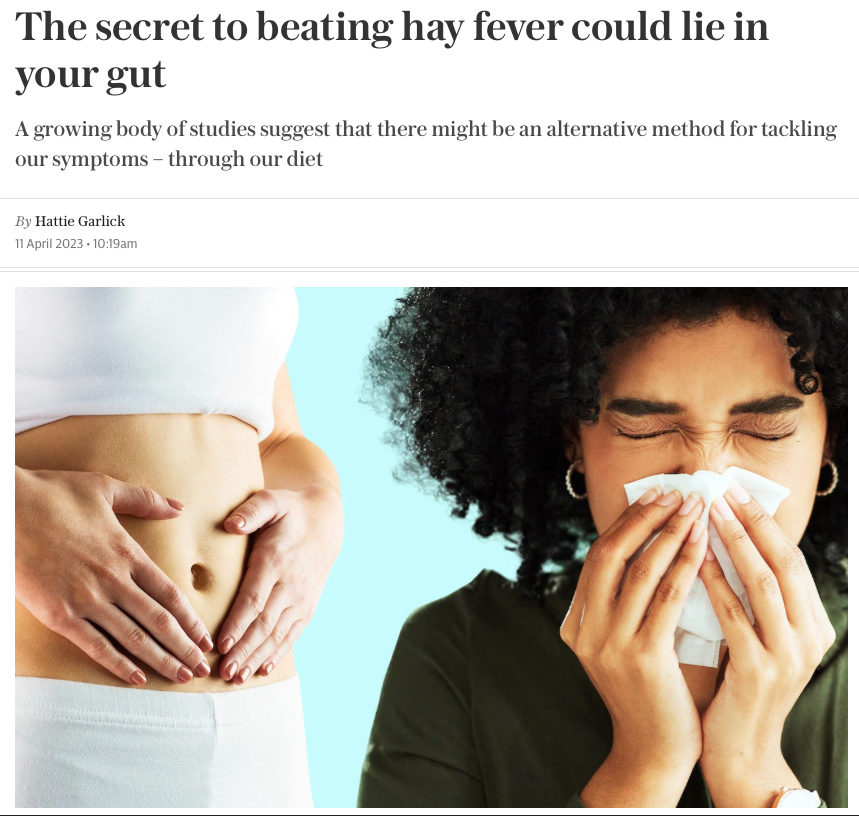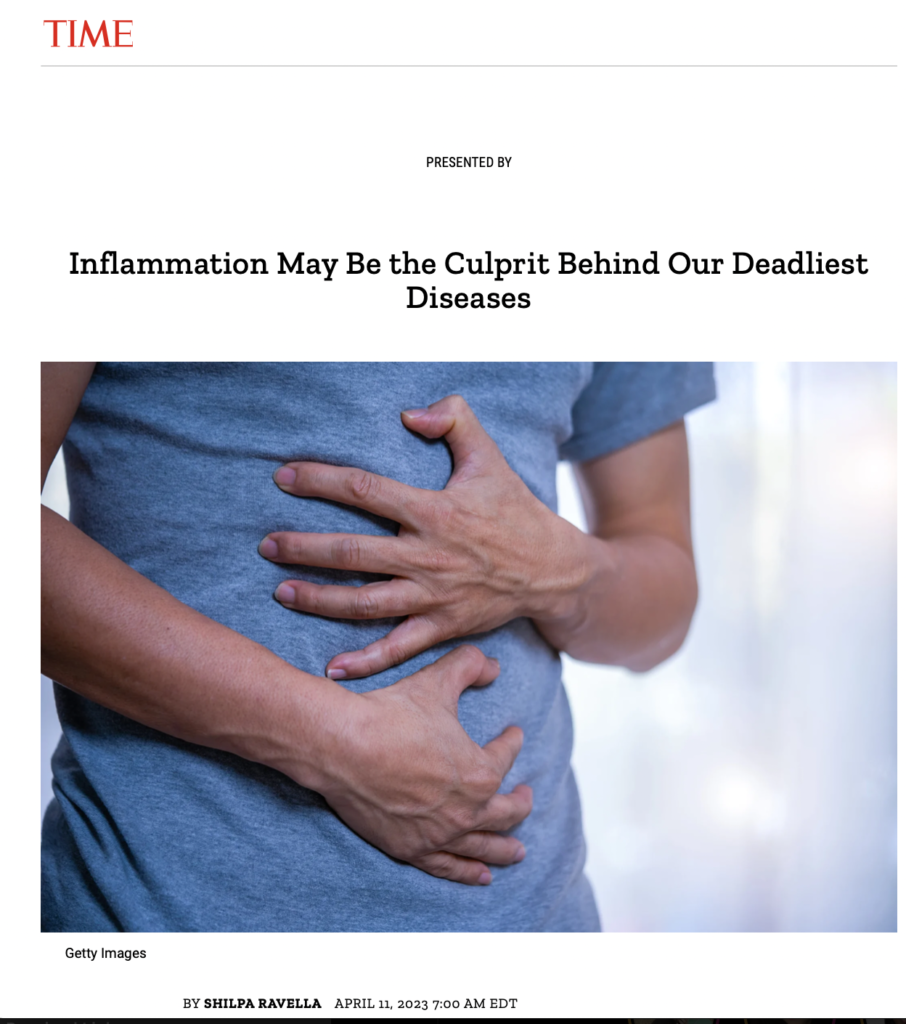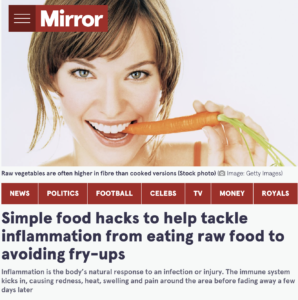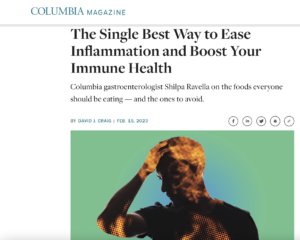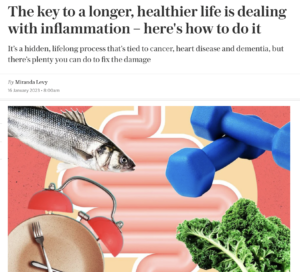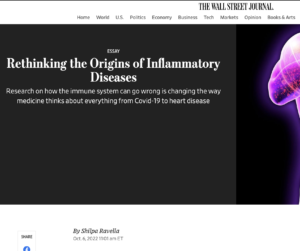The secret to beating hay fever could lie in your gut | The Telegraph
April 11, 2023
A growing body of studies suggest that there might be an alternative method for tackling our symptoms—through our diet.
So many people are suffering from allergies these days. I spoke with The Telegraph and Outside Magazine about allergies, lifestyle, and the immune system. Food is an important adjunctive treatment that can help to prevent, suppress, and even reverse inflammation in those with allergies.
Quercetin, a polyphenol found in foods like onions, cabbage, broccoli, and berries, acts as an antihistamine. Vitamin C, found in citrus fruits, is another natural antihistamine. Fermented foods like kimchi and sauerkraut are linked to lower inflammation and the cultivation of an anti-inflammatory gut microbiome. And simply drinking enough water to stay hydrated is supremely anti-inflammatory!
Inflammation may be the culprit behind our deadliest diseases | TIME
April 11, 2023
By Shilpa Ravella
That inflammation is a common element in humankind’s top killers—heart disease and cancer—is unlikely to be serendipitous. The intricate link between inflammation and modern chronic diseases is rooted in our evolutionary history. In order to survive infections, famine, and other dangers in brutish ancestral times, we developed hyperactive immune systems and insulin-resistant bodies adept at storing fat. But our modern environment has been markedly transformed, from the food we eat to the air we breathe, how we move and more. Our immune system is exceptionally sensitive to the triggers of this new world, portending a higher risk of chronic, hidden inflammation.
In the 21st century, as hidden inflammation weaves through our deadliest diseases, unveiling this force—seeing what has long been unseen—is poised to make its mark on medicine.
Simple food hacks to help tackle inflammation, from eating raw food to avoiding fry-ups | The Daily Mirror UK
April 1, 2023
There are steps we can all take to prevent and reverse inflammation, and it starts with what we eat.
I spoke with Luisa Metcalfe on the small changes to the way you choose, prepare and eat your food that could reap big health rewards.
Loneliness isn’t just bad for your mental health–it can compromise your immune system | Salon
April 1, 2023
By Shilpa Ravella
New studies find that being chronically lonely affects us in ways that go deeper than the mind.
The epidemic of loneliness in this country, according to United States surgeon general Vivek Murthy, is a “public health crisis on the scale of the opioid epidemic or obesity.”
How exactly does loneliness contribute to disease? The danger to one’s survival from perceived loneliness can affect various processes in our body, including those involved in metabolism — which governs the conversion of food into fuel, among other things — as well as neurologic, endocrine, and immune responses. Our immune system, in fact, responds to loneliness as it would the threat of a deadly virus, producing more inflammatory cells and proteins. Ongoing loneliness may lead to chronic, low-level inflammation.
The single best way to ease inflammation and boost your immune health | Columbia Magazine
Fortunately, scientists have made progress in understanding how to prevent runaway inflammation, which occurs when the immune system becomes hyperactive and attacks healthy tissues. Studies suggest that avoiding exposure to tobacco smoke, air pollution, and other environmental irritants can help, as can limiting one’s alcohol use and reducing stress. But some of the biggest scientific breakthroughs have come in understanding the massive role food plays in boosting — or busting — the immune system.
The key to a longer, healthier life is dealing with inflammation – here’s how to do it | The Telegraph
I spoke with Miranda Levy about how to deal with inflammation in the body.
In the short term, inflammation is a normal healthy response to invaders. When your body encounters an offending agent – such as viruses, bacteria or toxic chemicals – it activates the immune system. Your immune system sends out its first responders: inflammatory cells and cytokines (substances that stimulate more inflammatory cells) to neutralise the intruders or to start healing injured tissue. In acute inflammation, the body jumps to immediate attention – for example, healing a cut. But with chronic inflammation, your body continues sending inflammatory cells even when there is no outside danger.
Rethinking the origins of inflammatory diseases | Wall Street Journal
By Shilpa Ravella
There is a yin and yang to inflammation that is analogous to using a fire hose. Too little water pressure in the hose and the fire—be it a germ or another intruder—wins. Too much and the body can turn on itself, drowning in autoimmunity. But sometimes the hose simply leaks, and a low-level inflammation simmers quietly in the body. We cannot see hidden inflammation with our naked eye—as we can the swollen joints of patients with rheumatoid arthritis and the rashes of those with lupus—or with the tools we typically use to diagnose inflammatory diseases. Otherwise healthy people walking around with this type of inflammation are entirely unaware that it exists within them. There may be no obvious signs or symptoms.

